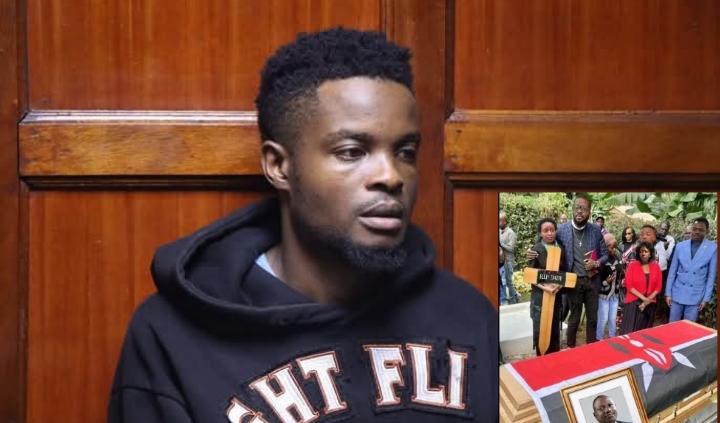KENYA : The Government of Kenya has started crackdown on Social Media users, who have been sharing AI Generated images and editing Photos depicting leaders deceased.
A young Kenyan identified as Benson Malova Ashiko who posted a photo on X (Twitter) depicting a fake funeral for the head of state was today arraigned in Court.
The Social Media user, posted a funeral Procession by the graveside, with a coffin Covered in the Kenyan Flag and attendees around the graveside.
He then edited images of the attendees, replacing the faces with President Ruto's Family Members.
Benson Malova Ashiko, has been arraigned in Milimani Court and charged with cybercrime.
He will remain in custody until 30th January, 2025, pending investigations.
President Ruto's administration is facing persistent challenges from an increasingly activist Generation Z population.
The government of Kenya is struggling with cyber-activism, where young people are using social media platforms to criticize state initiatives, spread information about government activities, and organize protests.
The Young Libertarians are expressing their growing dissatisfaction with issues like unemployment, corruption and unfulfilled campaign promises.
Government officials have decried the Movement's impact, terming it as "cyber-bullying" aimed at delegitimizing President Ruto's actions.
The movement's impact has extended internationally, with activists gathering signatures opposing the Dutch royals' planned visit to Kenya.
It has also fueled appeals to the International Criminal Court, prompting the Kenyan Ministry of Foreign Affairs to express concern over "cyber activities spreading misinformation."
This tech-savvy generation has transformed ethnic and political divisions into a pan-African narrative that challenges the post-colonial state.
They use grassroots mobilization and sophisticated digital strategies to make it harder for governments to repress dissent.
The movement's leaderless, decentralized structure and ability to quickly adapt tactics to police brutality in Kenya, make it effective.
This activism seeks systemic change rather than political representation and extends beyond national borders to address regional governance issues.
The movement has maintained momentum despite government crackdowns and used international attention to pressure domestic institutions.
At the beginning of the year, Kenyan President William Ruto warned that the country’s moral fabric is at risk of decay if the manipulation of the digital spaces, more especially that of social media, is going to continue.
The Ministry of Interior has since issued a directive after senior government officials and a section of politicians complained about the misuse of social media, particularly among Kenyan youth.
In a statement on Thursday, January 16, Interior PS Raymond Omollo stated that these companies must set up physical offices in Kenya to enhance accountability and address the increasing misuse of social media platforms.
“To ensure responsibility and accountability in the face of rising disinformation, social media manipulation, and online abuse, all social media organizations operating in the country must establish a physical presence within our jurisdiction,” read the statement in part.
PS Raymond Omollo who was speaking during a meeting with telecommunications companies and social media platform representatives said the increasing misuse of social media, including harassment, hate speech and incitement to violence, necessitates immediate and decisive measures.
“Strict compliance with this requirement is expected with telecommunications providers and platform owners required to take stronger action against criminal activities online,” he said.
This decision is set to affect popular social media platforms such as Elon Musk's X (Formerly Twitter) Meta-owned Facebook and Instagram, TikTok, YouTube, Snapchat, LinkedIn, Pinterest and Snapchat.







